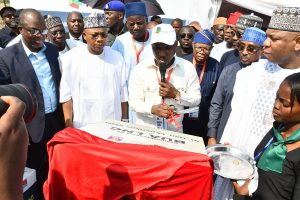
Emmanuel Addeh
The Nigerian National Petroleum Company Limited (NNPCL) yesterday officially marked the end of its operations as a corporation after the transfer of assets worth $60 billion, as well as the takeover of liabilities from the old NNPC, as prescribed by the Petroleum Industry Act (PIA).
The company announced that having successfully crossed that legal requirement, within the stipulated 18 months in line with section 54 (3), the ‘cutover’ now means all its operations will be done in the name of NNPC Limited.
Speaking at the event in Abuja, which drew key industry players, the Group Chief Executive Officer of the company, Mallam Mele Kyari, noted that the move would ensure seamless availability of financing for major projects as lenders are now more willing to do business with the NNPC.
Before now, he stated that financial institutions did not see the ability of the company to repay loans and therefore could not guarantee funding.
“And therefore, before now, we will talk and talk and at the end, we don’t have access to financing. Now everyone can see that we’re a large company. There’s no company with $60 billion assets. It doesn’t exist in this country.
“So, we’re the largest company in this country. We’re also the largest company in Africa…Let me be frontal about it, our past structures were designed around individuals and geopolitical zones. It’s no longer so. Today we have a slim management structure which recognises only our ability to deliver,” he stressed.
Kyari stated that while the law provides that the NNPC could decide to leave a certain class of assets, the NNPC Limited has resolved to take over the entire assets and liabilities of the defunct corporation.
“But you will ask me, so what do I want to do with the assets? The assets are the overall joint venture assets and other businesses that the company has got. The shareholders have transferred all the assets to us, so there is no asset that is left outside.
“The law provides that we can potentially leave some of them behind. By today’s counting, every asset of the corporation, including its liability has been transferred to the NNPC limited and I repeat that the liabilities are far less than the assets that we have. So, it’s a very comfortable situation,” Kyari added.
With the new law, the GCEO stated that there’s now a clear line of sight on the company’s financing operations, including the retention of part of the dividends and retention of 30 percent oil profits from Production Sharing Contracts (PSCs).
He recalled that in 2018, the corporation as it then was, lost N803 billion, noting that since then enormous work had been done which eventually reduced the losses from N803 billion to N2.3 billion, explaining that by fiscal 2020, the company returned to the path of profitability with N287 billion and N674 billion in 2021.
To meet its status as a limited liability company, Kyari stated that the NNPC is now driving down costs substantially, growing oil production, noting that drilling has now crossed 1.6 million barrels per day and the company intends to hit 1.8 million barrels per day in the next three months.
Kyari stated that the new NNPC was working to grow the country’s gas assets and will be able to deliver up to 8 billion SCF of gas into the domestic market in the near future.
However, he stated that since Nigeria as a country has decided to retain petrol subsidy for now, such payments have crossed N400 billion monthly.
Kyari explained that the oil company was spending about N202 as subsidy on every litre of petrol consumed across the country, stressing that about 65 million litres of the product was pumped daily into the market.
He pointed out that the subsidy had been a severe strain on NNPC’s cash flow.
In his remarks, the Minister of State, Petroleum Resources, Chief Timipre Sylva, said the crystallisation of the PIA remains only a means to an end, for the enthronement of a vibrant, sustainable, efficient and investment-friendly petroleum industry which will improve Nigeria’s revenue base, create jobs and support its economic diversification agenda.
“To get to this desired end, deliberate effort must be made to implement the law in a manner that best achieves the stated objectives in line with the yearnings and aspirations of Nigerians whose lives will be impacted by the consequences of our decisions and actions.
“As part of the commitment to achieve a viable National Energy Company, the PIA put a long stop date of 18 months from the effective date of the Act as the timeline within which full transfer of assets, interest and liabilities must be completed,” he said.
He assured that NNPC Limited was positioned to lead Africa’s gradual transition to new energy, by deepening natural gas production to create low-carbon alternatives and changing the story of energy poverty at home and around the world.









